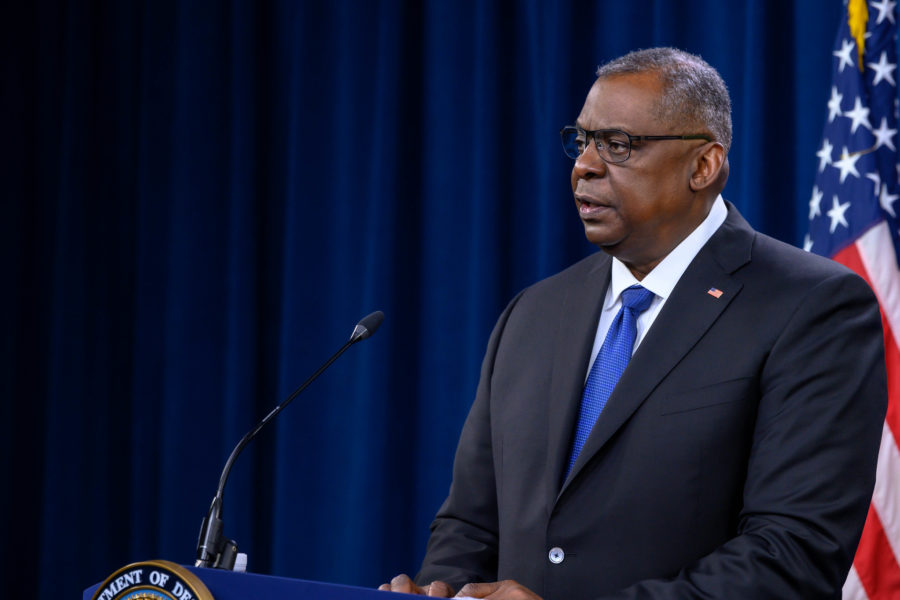Defense Secretary Lloyd J. Austin III is recommending that the military remove the prosecution of sexual assault and related crimes from the chain of command amid a Congressional push to reform military justice and an independent commission’s review of Defense Department policies.
Austin, in a June 22 statement, said he reviewed the recommendations of the Independent Review Commission on Sexual Assault and Sexual Harassment. He said that “in coming days,” he will recommend to President Joe Biden to amend the Uniform Code of Military Justice to remove the decision to prosecute sexual assaults and related crimes, to include domestic violence, from a commander’s purview.
The decision comes as Congress is considering a measure that would reform military justice to do the same, along with more crimes to include murder, manslaughter, child endangerment, child pornography, and negligent homicide. Austin’s statement only mentioned sexual assault and related crimes.
Before Austin had released his statement, Senate Armed Services Committee Ranking Member Sen. Jim Inhofe (R-Okla.) released letters from the chiefs and the Chairman, as a bipartisan group of more than 30 senators are pushing ahead with a bill to overhaul military justice by handing the decision to prosecute certain crimes to independent prosecutors.
The Military Justice Improvement and Increasing Prevention Act aims to “create a more professional and transparent military justice system for serious crimes.” Sen. Kirsten Gillibrand (D-N.Y.) said, when unveiling the proposal, that a 2018 study determined one in 16 military women reported being groped, raped, or sexually assaulted in other ways during their military service. Almost 21,000 instances of sexual assault were reported that year, up from 14,900 two years before.
Inhofe acknowledged the seriousness of the problem but questioned the proposed solution. “Any instance of sexual assault is too many, and eliminating sexual assault and harassment from our military and holding perpetrators accountable demands action,” he said. Congress has passed 250 provisions to address sexual assault and harassment in the military over the past 15 years, he said, and some measures have only recently begun to take effect. His statement did not elaborate. While fixing the problem is urgent, a rushed solution risks unforeseen consequences, he said.
Chairman of the Joint Chiefs of Staff Gen. Mark A. Milley wrote that the proposed changes “may have an adverse effect on readiness, mission accomplishment, good order and discipline, justice, unit cohesion, trust, and loyalty between commanders and those they lead.” He urged caution in potentially undermining commander authority, ensuring that any changes be “rigorously analyzed, evidence-based, and narrow in scope, limited only to sexual assault and related offenses.”
Milley acknowledged that the military has failed to make “sufficient progress in recent years to eliminate sexual assault, and we have consequently lost the trust and confidence of Soldiers, Sailors, Airmen, Marines, and Guardians in the chain of command’s ability to adjudicate these serious crimes.”
Air Force Chief of Staff Gen. Charles Q. Brown Jr. also questioned the proposed solution to a difficult problem. “I am open to improving our processes that deliver justice,” he wrote. “I do not know if removing commanders’ authority to act on certain offenses will affect the occurrence of sexual assault to the degree we all desire and need … Removing elements of authority will likely create some risk, particularly if poorly scoped, communicated, or implemented.”
But he added that there may yet be reason to “try new measures if we believe they will increase accountability and reduce sexual assaults.” He also argued that “Implementation should reinforce [commanders’] responsibilities in the process, not relieve them from it.”
Chief of Space Operations Gen. John W. “Jay” Raymond said that, since the military has not made substantial progress in reducing the rates of sexual assault, it is time to consider changes. But he said he worries that removing commanders’ ability to enforce discipline in sexual assault and harassment cases poses “a risk that commanders may not display the same focus on prevention efforts.”
Milley, Brown, and Raymond all urged that any changes to the Uniform Code of Military Justice should be limited to sexual assault and harassment.
Inhofe said the issue is too critical to get wrong. “Given how important it is to get this right, … I wanted to understand what [top military leaders] believed would result from this legislation becoming law—would it truly reduce sexual assault or other crime in the military?” Inhofe said. “Their answers were, across the board, not reassuring. … As I would expect … each chief committed to striving to fulfill any law Congress enacts, given enough time and money. But I will note: This bill provides neither time nor money—it only allows for six months to make wholesale changes to the military justice system, provides zero resources for its implementation, and actually prohibits an increase in new personnel to implement these massive changes. Further, it leaves reforms to the Space Force and the Reserve Components—particularly the National Guard—out in the cold.”
In addition to the 30 cosponsors, the bill has been endorsed by the Veterans of Foreign Wars, the Iraq and Afghanistan Veterans of America, Vietnam Veterans of America, Protect Our Defenders, the National Alliance to End Sexual Violence, SWAN, the National Coalition Against Domestic Violence, Common Defense, and the Veterans Recovery Project.
Austin, in his statement, said he is also directing his staff to review additional recommendations from the commission and called on Congress to provide additional authorities needed to make related changes.
